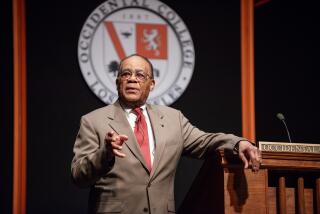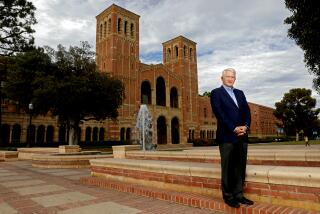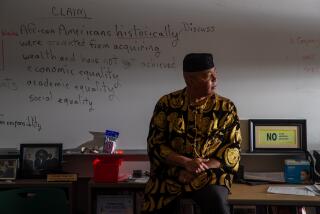Elias A. Blake Jr., 77; an advocate for black colleges
- Share via
Elias A. Blake Jr., a former college president who was a leading advocate for the nation’s historically black colleges and universities, died June 11 of cardiopulmonary disease at his Washington, D.C., home. He was 77.
Before and after his tenure as president of Clark College in Atlanta from 1977 to 1987, Blake was a professor, scholar and policy analyst in Washington, and spent more than 15 years at Howard University. He brought fresh attention to the role of historically black colleges and became an authority on desegregation and the black educational experience.
In 1970, Blake published a study showing that 70% of all African Americans with bachelor’s or graduate degrees were educated at historically black colleges. The report led to a meeting among President Richard Nixon and several college presidents and laid the foundation for amendments to the federal Higher Education Act that expanded support for predominantly black colleges.
From 1969 to 1977, Blake was president of the Institute for Services to Education, a Washington organization that helped distribute more than $500 million in federal grants and other aid to the nation’s black colleges.
He previously had been instrumental in the development of Upward Bound, a federal program designed to help low-income high school students pursue higher education.
Blake, who was born in Brunswick, Ga., and grew up under the laws of the segregated South, understood the limitations of poverty and racial discrimination firsthand. He lost both of his parents by age 12 and went to live with his grandmother. He began working at a hotel in his teens and often credited his education with saving him from a life of menial labor.
It was a paradox, he said, that school integration resulting from the Supreme Court’s landmark Brown vs. Board of Education decision of 1954 removed control of black schools from the black community. As a result, he said, expectations were lowered and black students began to fall behind their white counterparts.
“You look at any high school in this country,” Blake said in a 2004 interview with Newhouse News Service. “You will see that the faculties in those high schools do not believe that black children are as capable as white children.”
Blake viewed his own high school teachers with affection and awe, recalling that they demanded he read Shakespeare, Thoreau and Langston Hughes, and accepted no excuses for failure.
After he received a scholarship to Paine College, a historically black school in Augusta, Ga., Blake recalled in 2004, his principal warned him: “You cannot be up there embarrassing me and your grandmother and damaging the prospects of future students we send there.”
Blake excelled in football and basketball and graduated as valedictorian of his college class. After two years of Army service in Germany, where he tutored soldiers, he came to Washington and earned a master’s degree in education from Howard in 1954. He received a doctorate in education from the University of Illinois in 1960, then taught education at Howard until 1966.
After working in policy research and curriculum development at the Institute for Services to Education, Blake put his ideas into practice at Clark, where he strengthened the faculty, created business and music programs and secured millions of dollars in grants for other improvements.
A year after Blake resigned as president in 1987, Clark merged with another historically black institution, Atlanta University.
From 1987 to 1992, Blake was director of Howard’s Division of Higher Education Policy Research. Since 1992, he had been president of Benjamin E. Mays National Educational Resource Center in Washington, where he analyzed racial differences in educational opportunity and often consulted or served as an expert witness on desegregation cases.
Blake played trumpet in his youth and was a lifelong lover of jazz. In 1982, he was executive producer of “Film in Search of Improvisation,” an educational film on jazz featuring Dizzy Gillespie, Max Roach and Mary Lou Williams.
Survivors include Mona Blake, his wife of 43 years, and two sons.
More to Read
Sign up for Essential California
The most important California stories and recommendations in your inbox every morning.
You may occasionally receive promotional content from the Los Angeles Times.













